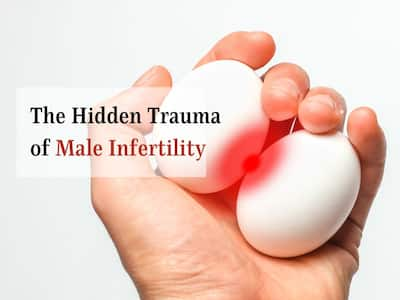
Have you ever spent a minute thinking what a man goes through when he is suffering from any types of infertility issues? Scroll down to understand the hidden trauma.
Infertility can be a deeply personal and emotionally challenging experience. While discussions surrounding infertility often focus on the female perspective, the psychological impact on men has often been overlooked. Men facing infertility often endure hidden trauma, struggling with emotional distress, societal pressures, and personal identity challenges. Unfortunately, it is a sad reality that even society makes men feel inadequate instead of helping them. Today, on Father’s Day, we will shower lights on the most commonly ignored topic — ‘hidden trauma of male infertility’. To help us understand the basics better, we have Dr Amitha N, Consultant – Fertility Specialist, Motherhood Hospital, Electronic City, Electronic City, with us. Scroll down to get a glimpse of how males deal with anxiety related to infertility.
The Hidden Burden That Comes With Infertility
Societal expectations place a heavy burden on men when it comes to their fertility. Society has long associated masculinity with virility, fertility, and the ability to procreate. Men are often expected to fulfil traditional roles as fathers and providers. When faced with infertility, men are made to feel a sense of failure and an overwhelming burden of guilt. These expectations increase the already existing pressure and guilt alleviating the emotional toll and contributing to feelings of inadequacy.
The Effects of Infertility On Men
Infertility has a huge emotional impact on men. Because of societal stigmas and the idea that infertility is predominantly a feminine issue, many men internalize their emotions and are hesitant to openly express their struggles. This silence and lack of support can exacerbate emotional pain, leading to feelings of loneliness, anxiety, sadness, and a loss of self-worth. The emotional burden of male infertility is exacerbated by a lack of awareness and compassion, leaving men feeling lonely and unable to share their anguish.
Infertility might test a man’s perspective of his manhood and identity. Because society frequently associates virility with manhood, men enduring infertility may question their masculinity. As they battle with their perceived failure to meet a basic component of their duty as men, they may experience feelings of emasculation, guilt, and loss. Infertility becomes a highly personal battle for them, damaging their self-esteem and overall well-being.
Infertility can strain relationships as couples navigate the emotional rollercoaster together. Men may feel a sense of guilt for their perceived role in the fertility struggles, while their partners may experience their own complex emotions. The strain on the relationship can manifest as communication breakdowns, increased tension, and decreased intimacy, further exacerbating the emotional burden for both partners. The journey through infertility becomes a shared struggle that requires open and honest communication, patience, and mutual support.
READ RELATED: Dear Men, Take Charge of Your Health Because It's Men's Health Week!
The grief and loss experienced by men facing infertility should not be underestimated. Infertility represents the loss of a deeply desired future that includes biological parenthood. Men may grieve the loss of the imagined family they had envisioned. Coming to terms with this loss and recalibrating their expectations for the future can be a significant emotional challenge, requiring support, understanding, and time to heal. Acknowledging and validating this grief is crucial in helping men navigate the complex emotions that arise from infertility.
The Hidden Trauma of Male Infertility
To address the hidden trauma of male infertility, it is essential to talk about it. By creating a safe and supportive environment, men can find solace in sharing their experiences and seeking support from others who have undergone similar challenges. Support groups, counselling services, and online communities can provide valuable spaces for men to express their emotions and find comfort in the shared journey.
Cultivating empathy, encouraging men to seek help, and shattering stigmas surrounding masculinity and infertility are crucial steps in supporting men on the infertility journey. By challenging societal stereotypes and fostering open dialogue, we can raise awareness about the emotional struggles men face during infertility, promoting empathy, understanding, and compassion.
In conclusion, male infertility carries hidden trauma that often goes unaddressed. The emotional distress, societal pressures, and personal identity challenges faced by men experiencing infertility can have a profound impact on their well-being. By acknowledging and addressing these issues, we can create a more supportive and inclusive environment that helps men navigate their infertility journey with empathy and understanding.
Total Wellness is now just a click away.
Follow us on
window.addEventListener(‘load’, (event) => {
// $(document).ready(function(){
$(‘#commentbtn’).on(“click”,function(){
(function(d, s, id) { var js, fjs = d.getElementsByTagName(s)[0]; if (d.getElementById(id)) return; js = d.createElement(s); js.id = id; js.src = “//connect.facebook.net/en_US/sdk.js#xfbml=1&version=v2.3”; fjs.parentNode.insertBefore(js, fjs);}(document, ‘script’, ‘facebook-jssdk’));
$(“.cmntbox”).toggle();
});
// });
});






